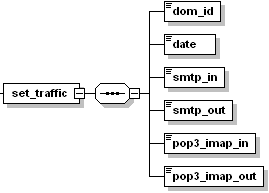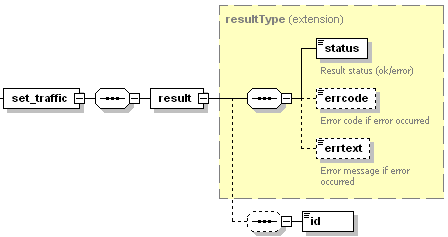Updating Traffic Usage Statistics
If the traffic usage is calculated on a site by statistics facilities of the Panel, this data is added to the system automatically. If this data is gathered using some external statistics means, the set_traffic operation can help manually update these data.
Request Packet Structure
Note: When creating request packets, put nodes and elements in the order they follow in the packet structure.
A request XML packet that sets traffic data for a certain site should include the set_traffic operation node:
<packet>
<webspace>
<set_traffic>
...
</set_traffic>
</webspace>
</packet>
The set_traffic node does not have a separate type, it is nested
within the complex type (site.xsd). The set_traffic node has the
following graphics representation:

Note: When creating request packets, put nodes and elements in the order they follow in the packet structure.
-
dom_id, required
It identifies a site whose traffic settings are set. Data type: integer.
-
date, required
It specifies the date for which the traffic data is set. Data type: date. Format: YYYY-MM-DD.
-
smtp_in, required
It specifies the incoming traffic (in bytes) got via SMTP protocol. Data type: integer.
-
smtp_out, required
It is used to show the outgoing SMTP traffic (in bytes). Data type: integer.
-
pop3_imap_in, required
It specifies the incoming traffic (in bytes) got via POP3 and IMAP protocols. Data type: integer.
-
pop3_imap_out, required
It is used to show the outgoing POP3/IMAP traffic (in bytes). Data type: integer.
Response Packet Structure
The set_traffic node of the response packet is structured as follows:

Note: The interactive schema navigator for all response packets is available here: http://plesk.github.io/api-schemas/1.6.9.1/agent_output.svg.
-
result, optional
It wraps the result of the requested operation. It can be missing if some error occurs before the validation starts. Data type: resultType (
common.xsd). -
status, required
It returns the execution status of the operation. Data type: string. Allowed values: ok | error.
-
errcode, optional
Is used to return an error code when the operation fails. Data type: unsignedInt.
-
errtext, optional
Can be used to return an error message if the operation fails. Data type: string.
-
id, optional
Returns the identifier of the site whose traffic is set. It is missing if the request packet fails before the validation on the server side. Data type: integer.
Samples
To set traffic information for the specified site, use the following packet:
<packet>
<site>
<set_traffic>
<dom_id>1134</dom_id>
<date>2005-12-12</date>
<smtp_in>514237124628</smtp_in>
<smtp_out>6153462547</smtp_out>
<pop3_imap_in>49769379</pop3_imap_in>
<pop3_imap_out>7236487263</pop3_imap_out>
</set_traffic>
</site>
</packet>
Response:
<packet>
<site>
<set_traffic>
<result>
<status>ok</status>
<id>19</id>
</result>
</set_traffic>
</site>
</packet>